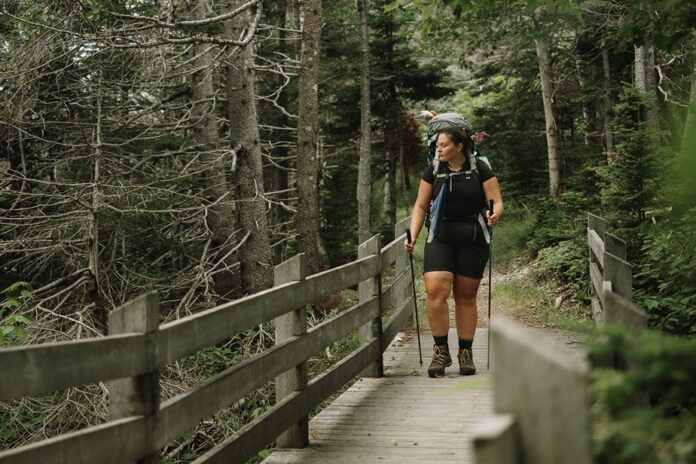A triathlon revisited. The adventure challenge of a lifetime. A documentary to promote body diversity. Because “there is a place for everyone” in the world of sport and the outdoors. Speech by Anabelle Guay.
“I’ve always loved movement, the outdoors, physical activity. But for a long time, I wondered if I had my place in that world because I didn’t see so many people who looked like me. »
Our interlocutor is Anabelle Guay, 23 years old. The young woman speaks to us live from Forillon National Park, in Gaspésie, where she joined her rowing boat. When the weather is favorable, she will row, alone in the ocean, to the marina on the island of Havre Aubert, in the Magdalen Islands. We are talking about 250 km.
This is the last stage of her revisited triathlon, which she calls La Grande Traversée and which has already taken her, since June 18, from Saint-Denis-de-Brompton to Mont Albert by bike (800 km) and from Mount Albert to Forillon National Park on foot (297 km).
Wait, what?
Rembobinons.
A few years ago she attended the Banff Mountain Film Festival. She came out “completely screwed up”; she, too, wanted to surpass herself.
“Coming out of that night, part of me was super excited to jump in and the other was like, ‘It’s funny how little you see people of any kind. »
“We’re used to seeing athletes doing incredible feats in adventure movies, but I believe there’s room for everyone. With that idea, I talked to a producer friend, and she was like, ‘Ana, I think we’re doing it. Let’s make an adventure documentary film with all of this.” »
Anabelle therefore killed two birds with one stone: she set up her great adventure, with the desire to act to promote body diversity in outdoor activity in mind.
Quickly, the idea germinated to travel the route between Estrie and the Magdalen Islands in the form of a great triathlon. A journey that is very familiar to the young woman, who made it by bike with her father at the age of 8.
Anabelle Guay took two years to plan her triathlon from a technical, financial, physical and psychological point of view. A fundraising campaign enabled him to find collaborators and partners, and to raise $104,000.
Since his departure on June 18, the Estrienne has traveled more than 1,000 km. The first 800, by bike, went well, despite a few ups and downs and an extended distance because she got lost on the way. She nevertheless covered the distance in 10 days, “as planned”.
It was the 250 km walk in the International Appalachian Trail that imposed some challenges on him. She was in a “constant state of hypervigilance,” she tells us.
“I saw moose, marmots, caribou and all that, but also bear droppings everywhere. I was like, my God, where am I? I experienced fear like I had never experienced before. I also understood how I reacted in these situations. »
The young woman is autonomous, the film crew that follows her being there only for “transitions”. Between the mosquitoes, the mice that prevented her from sleeping in the various shelters and the accumulated fatigue, she was at times discouraged.
Did she think about giving up? That, never. “For me, the objective is clear to go to the Islands. It’s hard, sometimes I wonder what I’m doing here, but I keep that in mind. »
“One morning when I was on foot, I woke up with two moose in front of me; a mother and her baby were crossing a small stream. It was like a beautiful nod to life. »
To plan this final step, the young woman received the help of a very special mentor: navigator Mylène Paquette, who crossed the North Atlantic by rowing solo in 2013.
“She’s going to help me with the weather on the crossing. There is also the same weather router that Mylène had, which is Michel. He comes from France. We’ll talk twice a day: morning and evening. He will lead me. […] There is no support boat that will follow me. For communications, it’s going to be by satellite phone. »
Anabelle Guay remembers the admiration she felt when, as a child, she watched adventure films. However, she was unable to imagine herself there, the absence of bodily diversity intensifying in her this feeling of exclusion. It is for this reason that she is carrying out her Grande Traversée in a spirit of bodily neutrality, that is to say out of a pure desire to surpass herself and discover herself.
The documentary that will be produced following his journey is, however, an adventure film strictly speaking. “Obviously it will highlight body diversity in the sense that I am who I am,” she says.
The section by boat being unpredictable, the young woman does not know when she will arrive at her destination. However, she knows what she will do when she arrives in the Islands, where the whole family lives on her mother’s side.
“We’re going to be a little gang to celebrate. The plan is to relax on the beach, take a vacation to relax a bit and drop me off! »















